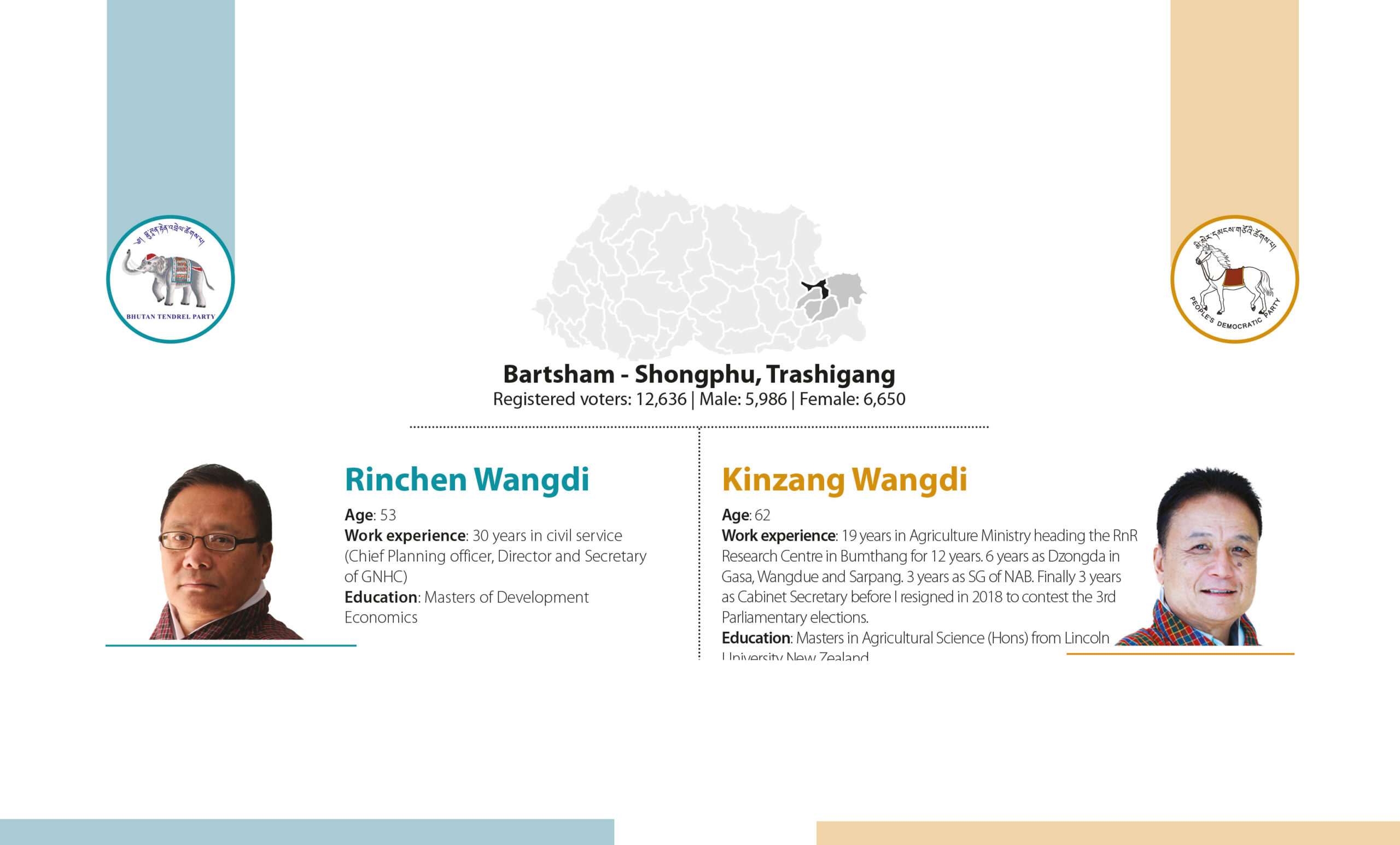Bartsham – Shongphu, Trashigang
Registered voters: 12,636 | Male: 5,986 | Female: 6,650
Rinchen Wangdi
Age: 53
Work experience: 30 years in civil service (Chief Planning officer, Director and Secretary of GNHC)
Education: Masters of Development Economics
Your favourite song?
I listen to all sorts of Dzongkha songs and I have no favourites but I prefer Zhungra.
Why did you choose to become a politician?
I believe that I am made for politics given my passion to serve the people and role I like to play in developing our communities. My desire to make a positive impact in society, a passion for policy making and public service and my belief in political ideologies are a few reasons. More importantly, it’s a calling for me to help strengthen our democratic culture and having served in the civil service for the last 30 years, I move on to take this responsibility seriously.
One thing that you dislike about elections in Bhutan
It is worth noting that no political system is perfect and each has its own challenges. The lack of voter education in the far-flung parts of the country still is a big challenge for Bhutan.
How important is money in elections?
Money plays a significant role in elections as campaign expenses are inevitable. It helps candidates and parties reach a wider audience and effectively convey their messages.
However, money is not the sole determinant of election outcomes. Factors such as experience, personality, personal relationship and voter preferences are also equally important.
Rural-urban migration or increasing fallow land, which is the bigger issue for the constituency? Why?
The two issues are interlinked as the former leads to the later. We need to address rural-urban migration to address the issue of fallow land. I feel it is mainly due to lack of comprehensive policies to promote balanced regional development, sustainable farming, and income generating opportunities.
Your three special pledges for the constituency are…
My three special pledges are 1. Mimang Zhabto, an efficient public service 2. Widening and double lane road between Trashigang and Ranjung, 3. Blacktopping of all chiwog roads and provision of chain links
You are a new face to your voters. Why should people vote for you?
On a personal note, I am not new to my voters. In fact, I am closely connected to the people of my constituency as I have been involved in various policy making and implementation of the developmental works during my 30 years in the Ministry of Finance and Planning Commission. While in service, I have always maintained good relationships with the people and I am involved in a lot of social service in my community and people know me quite well.
In the political arena, I may be new as Bhutan Tendrel Party itself is new. Nevertheless, I feel people should vote for me for the following reasons:
I can offer a fresh perspective and innovative ideas that may resonate with voters who are looking for change.
My commitment to transparency, accountability, and my genuineness to work for the interest of the people rather than for personal gains.
I can effectively represent the people, be their voice, understand their concerns and help them fulfil their aspirations.
Kinzang Wangdi
Age: 62
Work experience: 19 years in Agriculture Ministry heading the RnR Research Centre in Bumthang for 12 years. 6 years as Dzongda in Gasa, Wangdue and Sarpang. 3 years as SG of NAB. Finally 3 years as Cabinet Secretary before I resigned in 2018 to contest the 3rd Parliamentary elections.
Education: Masters in Agricultural Science (Hons) from Lincoln University New Zealand.
Your favourite song?
Wai Doro Zam. The title sounds like a romantic song but it actually talks about the law of attraction and cause and effect, something to guide our life.
Why did you choose to become a politician?
For 31 years as a civil servant, I have served in various Dzongkhags and in the region but never in my Constituent Dzongkhag. Joining politics would allow me to serve Trashigang Dzongkhag and Bartsham Shongphu Constituency in particular.
One thing that you dislike about elections in Bhutan
It is divisive and becoming dirtier during each succeeding Parliamentary elections.
How important is money in elections?
Money is important in everything, not just in politics. But there is a risk that money may be given more importance in politics than desired. There is a huge risk that money may sway election results.
Rural-urban migration or increasing fallow land, which is the bigger issue for the constituency? Why?
There is no doubt that Rural-urban migration leads to fallow land. The real issue however is the lack of economic opportunities in my Constituency that triggers migration. If we have to reverse rural urban migration, we have to provide economic opportunities by bringing in projects and activities that will create jobs and markets. Mechanisation where possible will help make agricultural activities more attractive that will address fallow land issues.
Your three special pledges for the constituency are
Tourism, Hydropower and Better Roads.
You lost in the 2018 elections. Do you think you will win this election
In 2018, I had just 5 months to get to know my constituents. However, after I lost the 2018 elections, I invested the last 5 years to visit them for 2 to 3 months each year. This has allowed me to know the people better and understand their needs, problems and their aspirations for their community which have been amply reflected in my Constituency manifesto. My work during the last five years has also been appreciated by the people of my Constituency and has rewarded me with a win during the Primary elections on 30th November. I am grateful that they will support me this time too in pursuit of a Better Bartsham Shongphu Constituency.


